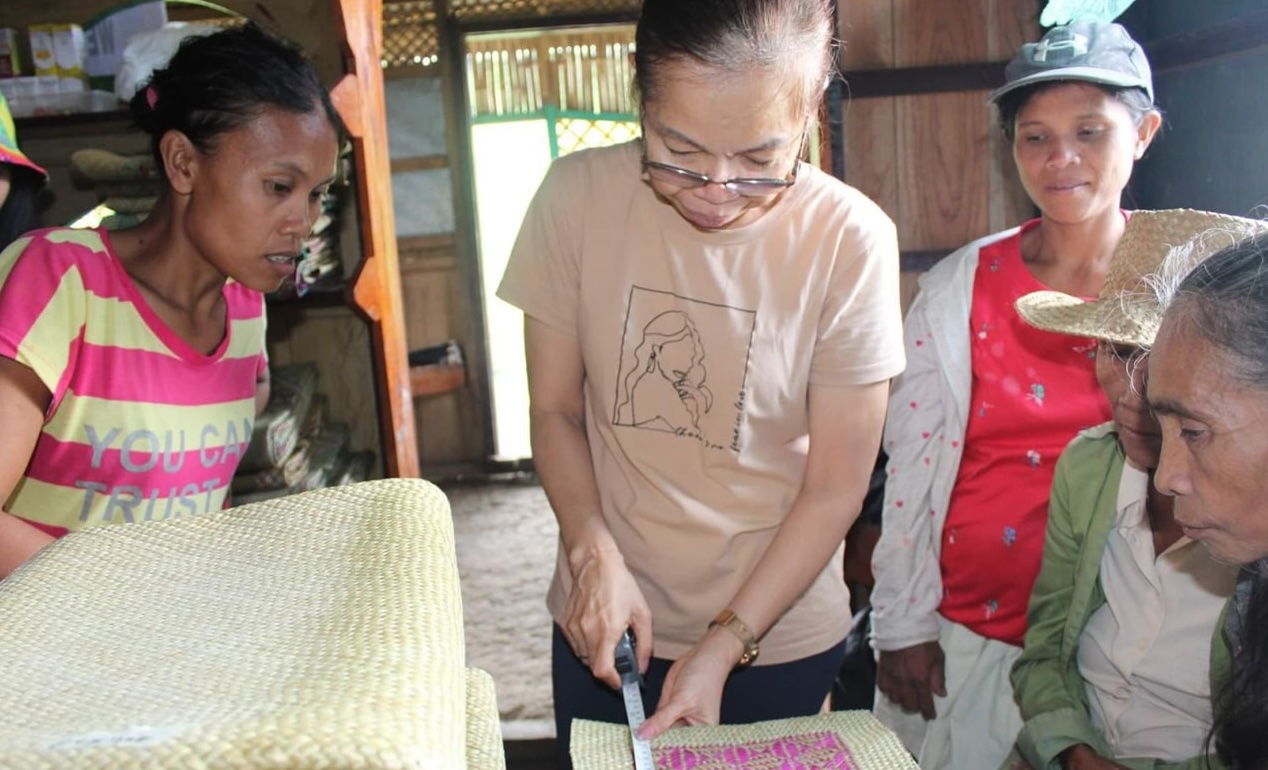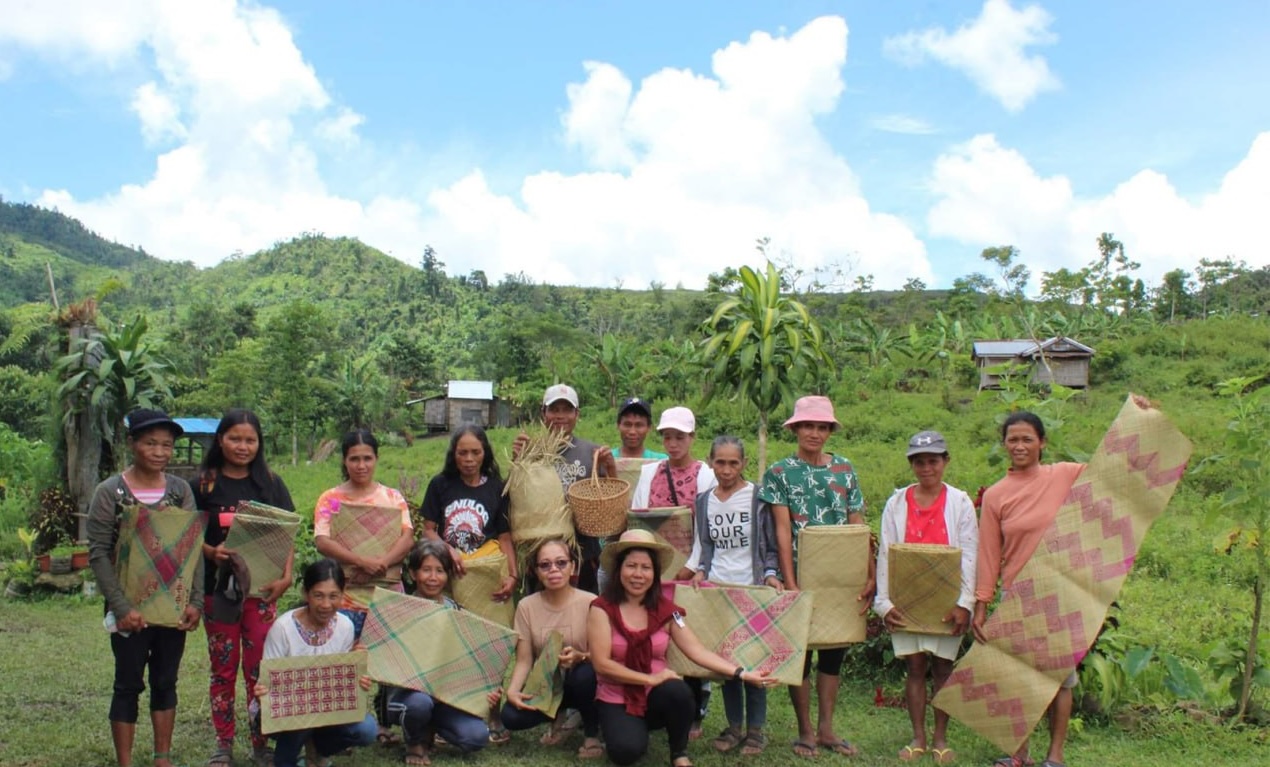Negros Occidental community breaks free from NPA influence thanks to 'banig' weavers
At A Glance
- For the longest time, residents at Sitio Madaja in the heart of Barangay Buenavista in Himamaylayan City, Negros Occidental had been living in fear and uncertainty as New People's Army (NPA) rebels were deeply embedded in the community.
- "Banig" (sleeping mat) weavers found a way to transform the community from an NPA-infested area to a haven of peace and hope.
- Through intensified anti-insurgency operations by the military under the 94th Infantry Battalion (94IB), Sitio Madaja was declared conflict-free in 2021.
- In June 2022, an assessment was conducted by the military to evaluate Sitio Madaja, its residents, and their available raw materials to develop banig weaving into a sustainable source of income for the residents so they would no longer be enticed to join the armed struggle.

For the longest time, residents at Sitio Madaja in the heart of Barangay Buenavista in Himamaylayan City, Negros Occidental had been living in fear and uncertainty. Jobs were scarce; basic needs and facilities were lacking such as electricity, farm-to-market roads, a source of potable water, comfort rooms, and school. On top of it, New People’s Army (NPA) rebels were deeply embedded in the community, keeping residents sleepless.
That was until “banig” (sleeping mat) weavers found a way to transform the community from an NPA-infested area to a haven of peace and hope, allowing residents to peacefully sleep at night.
Located at approximately 15 kilometers from Himamaylayan City, Madaja was included in the original clusters of sitios organized by the NPA Central Negros 2. It was considered as among the “hardcore areas” by communist groups in Negros.
Through intensified anti-insurgency operations by the military under the 94th Infantry Battalion (94IB), Sitio Madaja was declared conflict-free in 2021 although the threat of NPA resurgence still lurks, owing to the lack of source of income among the people.
In March 2022, newly appointed 94IB commanding officer Lt. Col. Van Donald Almonte deployed Community Support Program (CSP) teams to revisit previously cleared communities, including Sitio Madaja.
“Through this initiative, we uncovered the potential of Madaja in weaving 'banig' (sleeping mats). However, their market is currently limited to their community. Hence, we look for partners to help them in marketing and enhancing the quality of their product,” Almonte said on Sunday, Jan. 28.
In June 2022, the 94IB and the Association of Negros Producers (ANP) together with other volunteers conducted an assessment to evaluate Sitio Madaja, its residents, and their available raw materials to develop banig weaving into a sustainable source of income for the residents so they would no longer be enticed to join the armed struggle.
The 94IB consolidated the residents -- predominantly Indigenous Peoples (IPs) from the Bukidnon Magahat tribe -- to a single “minuro” or small settlement where they discovered that they possess the skill to weave quality banig using “tikog,” a special reed grass that grows in swampy areas along rice fields.
“When we were in the area, I confirmed that Tikog is abundant in their rice fields. So, we advised them to preserve and cultivate this grass because they use some of it as food for their farm animals,” ANP External Affairs Manager Sybel Nobleza.
Sustainable livelihood
Years of hardships due to the NPA scourge have taught Sitio Madaja residents to be vigilant. It was no different from their outlook on the military's presence in their community -- there was a notion among the people that the troops would no longer return after the first assessment or evaluation.
However, this was proven wrong by the soldiers who were eager to help the community to get back on its feet.

In July 2022, the 94IB and ANP returned to Sitio Madaja and other stakeholders to conduct an “Entrepreneurial Mind-Setting Workshop” using a module written in Hiligaynon dialect for better comprehension and engagement among the participants. Madaja tikog weavers were taught about the characteristics of an entrepreneur and how to run a business.
The workshop was followed by a “Product Development Training” in August 2022 which was participated in by the elders or the “master weavers” along with their children and grandchildren. They were taught about standard measurements and cost of their products, particularly for single, double, and family-sized sleeping mats. Prior to this, their monthly income from banig weaving ranged from P900 to P1,000 only.
In September 2022, the 94IB launched “Project Tikang” to empower the residents of Sitio Madaja by providing them with the necessary resources, training, market access, and support to establish sustainable livelihoods. The tikog weavers of Madaja were also organized and successfully registered with the Department of Labor and Employment (DOLE) under the name Madaja Hand Weavers Association (MAHAWA).
Through Project Tikang, sleeping mats woven by Madaja tikog weavers found their way to Metro Manila when they were showcased at the 36th Negros Trade Fair in Makati City in September 2022. The 94IB said that the sales generated from the fair made a significant impact on Madaja's economic growth totaling P461,000 in bookings and sales.
“The community was happy because, for the first time, the story of 'tikog' hand weavers from a formerly insurgency-ridden area was featured by both national and international media,” Nobleza said.
Major Gen. Marion Sison, commander of the 3rd Infantry Division (3ID) which supervises the 94IB, said the success story of the Madaja tikog weavers encouraged residents from other sitios to join their weaving association, and inspired the military to replicate the project to other conflict-free villages.
“The tale of Madaja's 'tikog' weavers strengthens our resolve to put an end to the decades-long insurgency that has hindered the rich culture and peaceful living of far-flung villages,” Sison said.
“Their story inspires us to intensify our efforts in empowering Geographically Isolated and Disadvantaged Areas, or GIDAs, by establishing people's organizations, enabling them to become more resilient while transforming into peaceful communities,” he added.